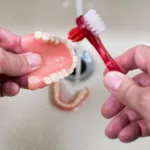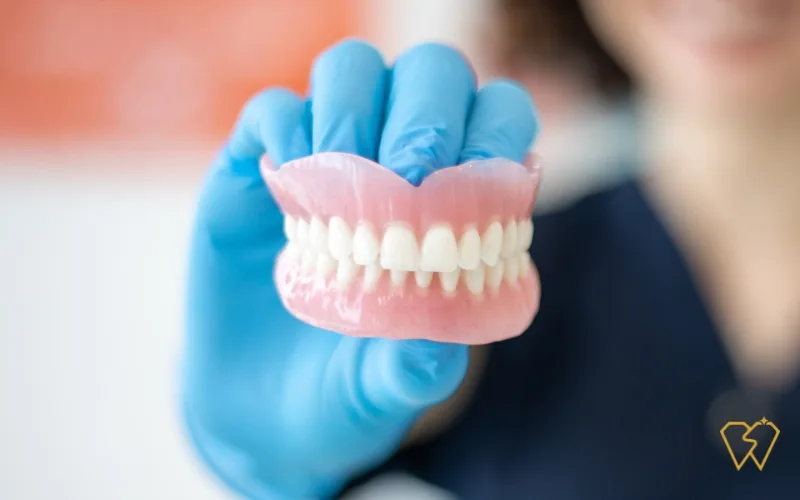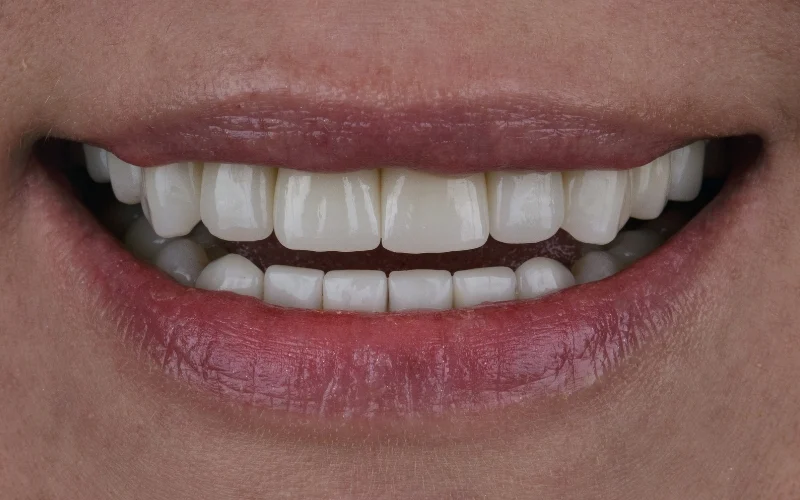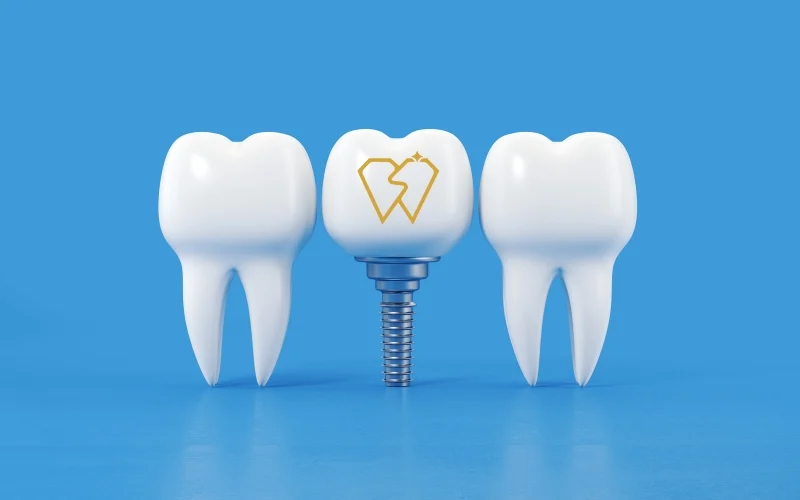Missing teeth significantly impact your life, from affecting your self-esteem and confidence to making it difficult to eat and speak properly. Fortunately, dentures can solve these problems, restoring the appearance and function of your smile which will lead to improving your overall quality of life.

What exactly are dentures?
Dentures are prosthetic teeth and gums that are custom-made for your mouth by your dentist to replace missing or extracted natural teeth. They can be complete or partial, which means they can replace all teeth on either the top or bottom gum line or only a few missing teeth.
Whichever type you choose, they will be specifically created to fit your mouth and visually resemble your existing teeth.
Types of dentures
There are two main types of dentures available: complete and partial.
Complete dentures
Full or complete dentures replace all the missing teeth on the upper or lower jaw and are made of acrylic or nylon molded to fit the wearer’s mouth. Complete ones come as conventional or immediate dentures.
A conventional denture is ready for implantation eight to 12 weeks after teeth extraction and healing.
Immediate dentures are made earlier and can be placed as soon as the teeth are extracted. The wearer doesn’t need to be toothless during the healing process. However, bones and gums decrease over time, especially after tooth removal.
As a result, when compared to the conventional type, immediate dentures require more alterations to fit well during the healing process.
Partial dentures
A removable partial denture or bridge, often made of replacement teeth, is bonded to a gum-colored plastic base, sometimes joined by a metal framework that keeps the denture in the mouth. Partial dentures replace a few missing teeth and are attached to a metal framework that clips onto the remaining natural teeth. This allows you to remove them easily for cleaning but still provides added stability and support.
A partial denture fills the gaps left by lost teeth and keeps adjacent teeth from shifting. A precise partial denture is detachable and is held in place by internal attachments rather than clasps that adhere to the surrounding crowns. This looks more natural.
In addition to these two main types, several styles are available, including conventional, immediate, and overdentures.

What are dentures made up of?
Dentures are typically made of acrylic, porcelain, or nylon that can be molded to fit the wearer’s mouth. A durable material like acrylic is used to make the base of dentures. This base is then fitted with false teeth, which can be made of acrylic, porcelain, or a combination of materials. The artificial teeth are carefully arranged to mimic the appearance and function of natural teeth and are attached to the denture base using an adhesive.
In addition to the acrylic or nylon base and the artificial teeth, dentures may include other components, such as metal clasps or frames, to provide added stability and support. Partial dentures, for example, may consist of a metal framework that clips onto the remaining natural teeth.
What is the procedure for getting dentures?
Getting a teeth denture typically involves several steps, including a consultation with a dentist, impression taking, fitting, and follow-up care.
Consultation
The first step is to consult a dentist, who will assess the health of the patient’s mouth and determine the best type of denture for their needs. The dentist will also discuss the patient’s goals and preferences and provide information on the different denture types.
Impressions
Once the type of denture has been selected, the dentist will take impressions of the mouth using a putty-like material. These impressions will be used to create a custom-fit set of dentures, which will be carefully crafted to match the shape and size of the patient’s mouth.
Fitting the dentures
Once the dentures are ready, the patient will return to the dentist for a fitting. The dentist will place the dentures in the patient’s mouth and make any necessary adjustments to ensure a comfortable fit. The patient may need to wear the dentures in the dentist’s office for a short period to get used to them and may need to return for additional adjustments as needed.
After the fitting, the patient will be given instructions on how to care for and maintain their dentures. This may include information on cleaning and soaking the dentures, handling and storing them properly, and scheduling regular visits to the dentist for check-ups and adjustments. The dentist may also provide information on potential complications and how to address them if they occur.
How do dentures work?
Dentures are designed to replace lost teeth while also restoring confidence in one’s ability to eat, speak, and smile.
Complete dentures are kept in place by suction or denture adhesive and replace all the teeth in the jaw. The denture’s base lies on the gums, while the fake teeth adhere to the base with glue. Partial dentures replace only a few lost teeth. They are affixed to a metal framework that latches into the remaining natural teeth. This adds stability and support while allowing the dentures to be easily removed for cleaning.
Overall, dentures work by providing a comfortable, practical, and natural-looking replacement for missing teeth.
How long it takes to get used to dentures?
Getting used to wearing dentures takes time, and the amount of time required varies according to the individual. Most people will need a few weeks to adjust themselves, but it can take longer for some people.
During the adjustment period, patients may experience discomfort or irritation in the mouth and difficulty speaking or eating. Follow the dentist’s instructions and wear the dentures as directed, even if they initially feel uncomfortable. Over time, the dentures will become more comfortable as the mouth adjusts to their presence.
Do you have to wear dentures 24 hours a day?
You do not have to wear dentures 24 hours a day. It is essential to remove them at night to allow the gums to rest. Most dentists recommend that dentures be removed at least eight hours daily and cleaned and soaked in a denture-cleaning solution overnight.
While it is not necessary to wear dentures 24 hours a day, it is critical to follow the dentist’s instructions. This may include wearing them for eating, speaking, and smiling during the day and removing them for cleaning and soaking at night.
How to care for your dentures?
Denture care and maintenance are critical to ensuring they last longer and continue to fit correctly. This includes daily cleaning and soaking, as well as regular visits to the dentist for check-ups and adjustments.

Regular brushing
Brush them thoroughly using a soft-bristled toothbrush or denture-cleaning solution. Brush all surfaces, including the artificial teeth and the base. Brushing the gums, tongue, and palate before inserting the dentures to remove any food particles and bacteria is essential.
Rinsing
After brushing the dentures, rinse them to remove any remaining soap or cleaning solution. It is crucial to handle the dentures carefully to avoid damaging them and to avoid using hot water, which can warp the acrylic or nylon.
Denture cleaning solutions
Denture-cleaning solutions help to kill bacteria and remove any plaque or stains that may have accumulated on your denture. Use a cleaning solution, and follow the manufacturer’s instructions.
Dental visits
Visit the dentist regularly for check-ups and adjustments. The dentist will check the fit and condition of the dentures and make any necessary adjustments to ensure a comfortable fit. The dentist may also provide additional guidance on caring for the dentures and maintaining good oral health.
How long do dentures last?
The longevity of dentures can vary based on various factors, including the quality of the dentures, the materials used, and the care and maintenance offered.
Generally, they can last several years, but they should be replaced every five to eight years or sooner if they become damaged or no longer fit correctly.
Using damaged or ill-fitting dentures can cause irritation, discomfort, and other dental issues; therefore you should visit the dentist when these problems appear.
Complications associated with dentures
While dentures can provide many benefits, they also have potential complications. Some of the most common complications include difficulty adjusting to wearing it, sores and irritation in the mouth, and the potential for them to slip or shift out of place.
Difficulty adjusting the dentures
One of the most common complications of dentures is difficulty adjusting to wearing them. This can include discomfort or irritation in the mouth and difficulty speaking or eating. These symptoms are typical and will typically improve over time as the mouth adjusts to the presence of the dentures. However, some people may have difficulty adjusting to wearing dentures and may need additional support and guidance from the dentist.
Development of sores
Another potential complication is the development of sores or irritation in the mouth. Ill-fitting dentures, poor oral hygiene, or other factors can cause this. Visit the dentist if sores or irritation develop. The dentist can provide treatment and make any necessary adjustments to the dentures.
Slipping of dentures
In addition, there is also the potential for dentures to slip or shift out of place, which can be uncomfortable and embarrassing. This is more likely to occur with complete dentures, which rely on an adhesive to stay in place. On the other hand, partial dentures are attached to a metal framework that clips onto the remaining natural teeth, providing added stability and support.
What is the cost of getting dentures?
The cost can vary depending on multiple factors, including the type of denture selected, the materials used, and the location and experience of the dentist. Complete dentures are typically more expensive than partial dentures. The cost may also be higher if they are made of high-quality materials or include additional features such as metal frameworks or attachments.
In addition to the cost of the dentures, there may be additional costs for consultations, fittings, and follow-up care. These costs can vary depending on the dentist and the location, and it is essential to discuss them with the dentist in advance. Some dentists may offer financing options or payment plans to help make the cost of dentures more manageable.
Below is the price of dentures in Stellar Dental, Malaysia:
Type | Price |
Partial denture | 1. Acrylic – Base + 1 tooth: RM450 – RM50 for each additional tooth 2. Flexible – Base + 1 tooth: RM850 – RM50 for each additional tooth 3. Chrome Cobalt – Base + 1 tooth: RM950 – RM50 for each tooth |
Complete denture | 1. Acrylic – Single arch RM1100 – Both arch RM2200 2. Flexible – Single arch RM1500 – Both arch RM3000 |
Are there any alternatives to dentures?
There are several alternatives to dentures that can replace missing teeth, depending on the individual’s specific circumstances. Other options include dental implants, fixed bridges, and removable partial dentures.
Dental implants are a common alternative, especially for people who have lost only a few teeth. Fixed bridges are another option for replacing missing teeth. A fixed bridge consists of a row of replacement teeth attached to two or more dental crowns placed over the remaining natural teeth on either side of the gap. Speak to your dentist to know more about the alternatives.
Final words
Dentures are an excellent option to replace missing teeth. It might be beneficial to see your dentist if you have space in your mouth from missing teeth. The best way to restore a healthy and effective bite is to make an appointment for a consultation. During the consultation, you can discuss your issues and objectives for your new, gorgeous smile.
At Stellar Dental, our skilled and experienced dentists can help you restore your smile and improve your oral health with a custom-fitted set of dentures. Our dentures are made of high-quality materials and are carefully crafted to match the shape and size of your mouth. Don’t let missing teeth hold you back any longer. Visit Stellar Dental today for your dentures and other dental treatment, and start enjoying the benefits of a healthy and beautiful smile. Contact us now to schedule an appointment!









